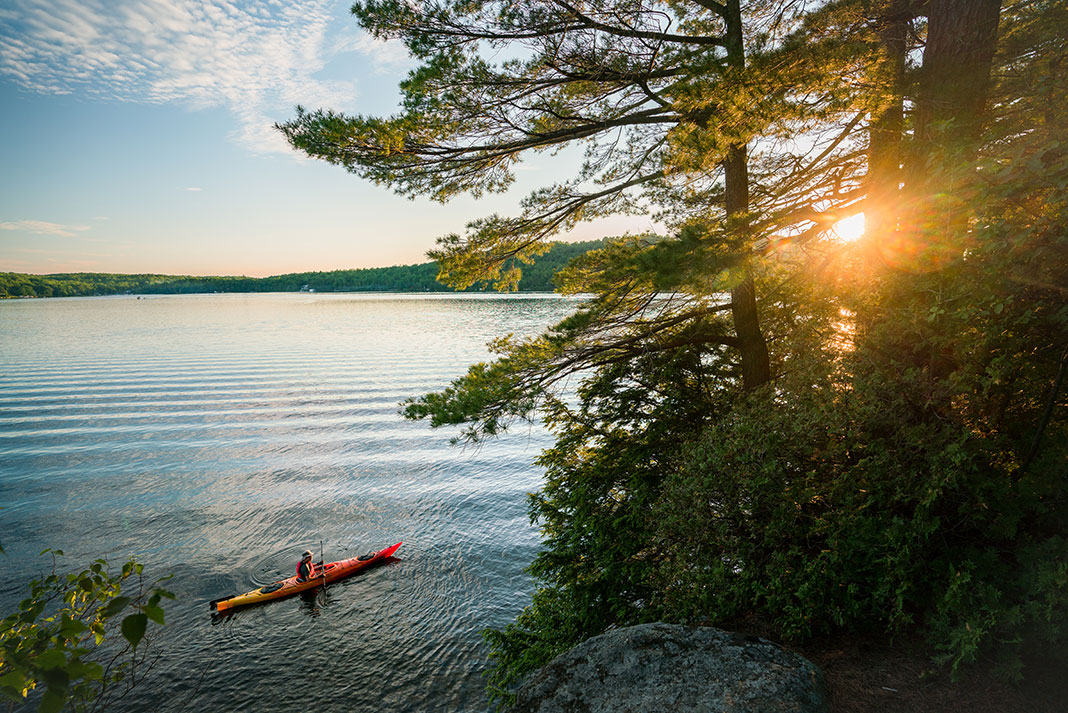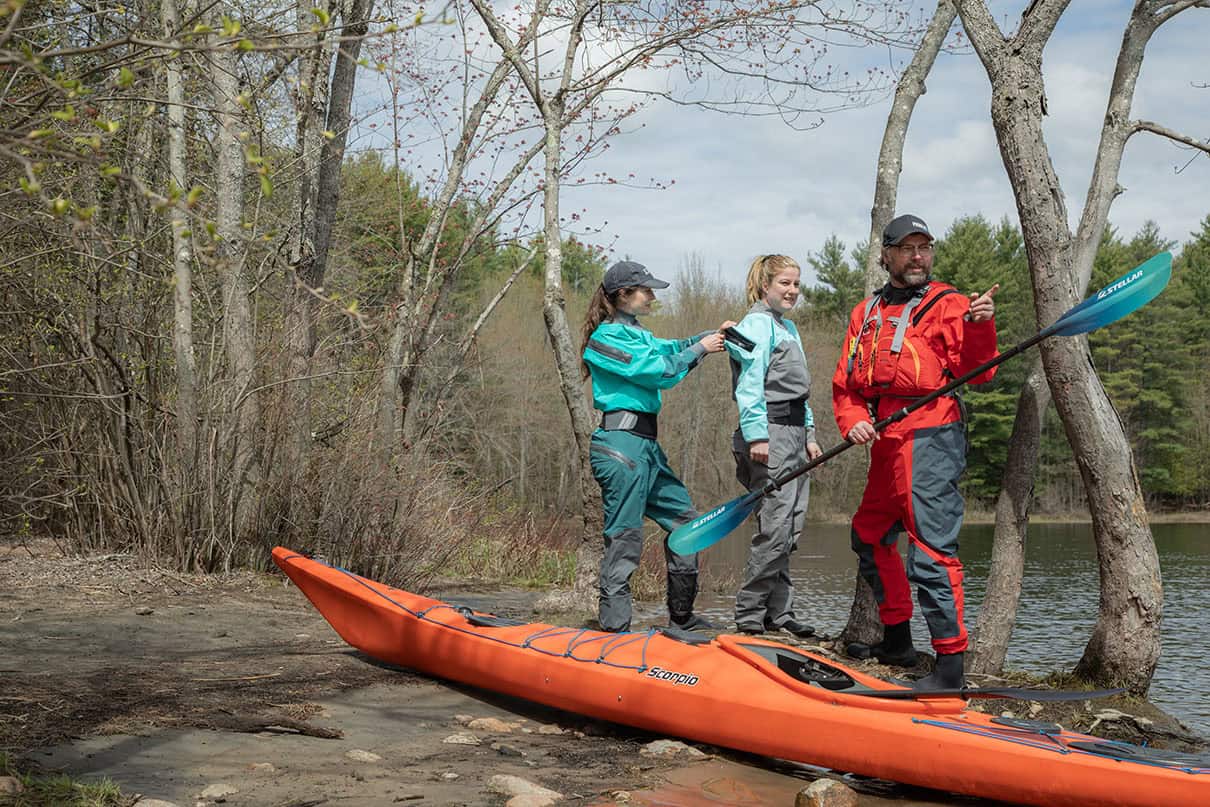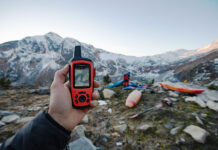I beach my kayak at a paddle-in campground. A fee box wants $12 to camp on a not-quite-flat spot with no access to drinking water. Next to the box is a garbage can overflowing with trash. The vault toilet, equally overflowing with aroma, has no toilet paper or hand sanitizer. I walk back to my kayak for my wallet and TP, muttering that we kayakers should have listened to Arthur Cecil Pigou. How we pay for paddling—and yes, we pay—is broken. Let’s fix it.
It’s time to change how we pay for paddling
Pigou was a climber, not a kayaker, about a hundred years ago. And he was an economist. If we want to keep kayaking, we need to get to know the guy.
Kayakers think of paddling expenses as kayaks, drysuits, carbon fiber paddles and plane fares to tropical getaways. But my glove compartment holds five passes for different park districts, boat ramps and national forests. We also shell out for access, permits and camping, not to mention programs to keep water clean and restore habitat. And we’ve been paying more for less for a long time. Oregon just jacked up its camping fees at state parks to a whopping $42.
Costs rise, but management funding has failed to roll up, down 16 percent in real terms in the past two decades. The deluge of outdoor recreation during the pandemic magnified the crisis. My home state grew from 2.8 million people when I first slid into a Perception Dancer to 4.2 million today. During those decades, we’ve opened just two new state parks.

User fees are based on the principle of “user benefits, so user pays.” That makes sense on paper but fails in reality. User fees account for just 11 percent of site management budgets, with maintenance backlogs as long as a thousand surfskis laid end to end, as of 2019. And the more you raise user fees, the bigger barrier you create to participation—price folks out, and they’ll stop coming.
“User fees cannot fund agencies struggling to keep up with operations, let alone add additional recreation infrastructure to meet growing populations and increased demand for outdoor recreation,” the Outdoor Industry Association noted in 2017.
The right disincentives can promote more positive behavior
Back when Pigou was climbing in the Lake District and teaching economics at Cambridge after World War I, he devised tax structures to tax things we don’t want, like smoking, burning carbon, water pollution, instead of things that are good for society, like income, employment, property and outdoor recreation. Pigouvian taxes put the money into offsetting those negative impacts, like health care or environmental restoration. As the higher cost of cigarettes leads folks to ditch the habit, less money for smoking cessation won’t be a big deal.
What we’re doing with paddling right now is the opposite. Paddling is a human-powered, low-carbon activity and builds an environmental stewardship ethic. Instead of jacking up the price on camping and still not having the bucks for toilet paper, we should tax what we want less of and use those funds to repair our outdoor recreation sites.
What would a Pigouvian setup to support kayaking look like? How about a hefty tax on two-stroke motors, which dump half their fuel into the water unburnt? And another on disposable plastic bottles turning the sea into an endocrine disrupter goo? I bet Arthur Cecil would be into that.
Neil Schulman writes, kayaks, photographs and does conservation work in Oregon, where outdoor recreation is (under)funded by the state lottery.
This article was first published in the Early Summer 2022 issue of Paddling Magazine. Subscribe to Paddling Magazine’s print and digital editions, or browse the archives.
The only constants in life are death and taxes—and kayaking. | Feature photo: Nicholas Spooner









In Scandinavia, Finland, we have so called everyman’s rights to move on water and land. It includes a right to set up a tent for one or two nights, as long as it is not in someone’s yard. Of course you leave the place with no trace.
As long as people respect the responsibilities attached to this right (leave no trace, do not harm animals or plants, no open fire without landowner’s permission) I hope we can keep the traditional right alive.
But your point on motor boating is good!
Like Niel who penned this article, I too have seen things change over the last several decades of paddling and not necessarily for the better, but I don’t agree with government taxing other people’s vices to pay for our recreational pleasures. It never works. The money just disappears into the bureaucracy. As far as Park Systems go, they are often understaffed in Security and Maintenance, and poorly managed (Ie. do we really need weekly Lawn mowings?) so thank the elected officials in your state or province. My state of 8 million people has only 40 or so Fish and Game people to enforce statewide environmental laws-its a minefield of poor behavior and neglect.
Meanwhile the Paddlesports industry has promoted and benefitted from record sales over the last two COVID ridden years. If ten dollars was tacked onto every kayak purchase or 5 dollars on every paddle or life vest purchase for example and set aside for river or lake campsites and preservation, then you might see some improvement. Golfers pay greens fees, Alpine skiers pay lift fees, Power boaters pay boat launch fees.
As far as crowded, unsanitary overused facilities go, did you ever see a big box outdoors supplier instruct people on paddling technique, ethics, regulations and safety? Ever see a kayak fishing supplier instruct on legal freshwater regulations and ethics? (While there may be some overlap, the new “sport” of kayak fishing is simply not the same as paddling. A vast majority of Kayak anglers can’t paddle or swim to save their lives, are out for trophies not an active pursuit in a natural setting, and I suspect based on observation, these newcomers fill up plenty of toilets and trash plenty of campsites). Yet they would tell you they are entitled since they paid for fishing licenses.
As people return to their gyms, beaches, malls and field sports, the Paddlesports industry may now well suffer in the next few years for the glut of used recreational and fishing kayaks soon to flood the market. It’s Karma.
But real, respectful paddlers will wither the storm. Like the previous responder from sparsely populated Finland indicated, the best we can do is keep paddling, leave no trace, set good example, and support real paddlesport.